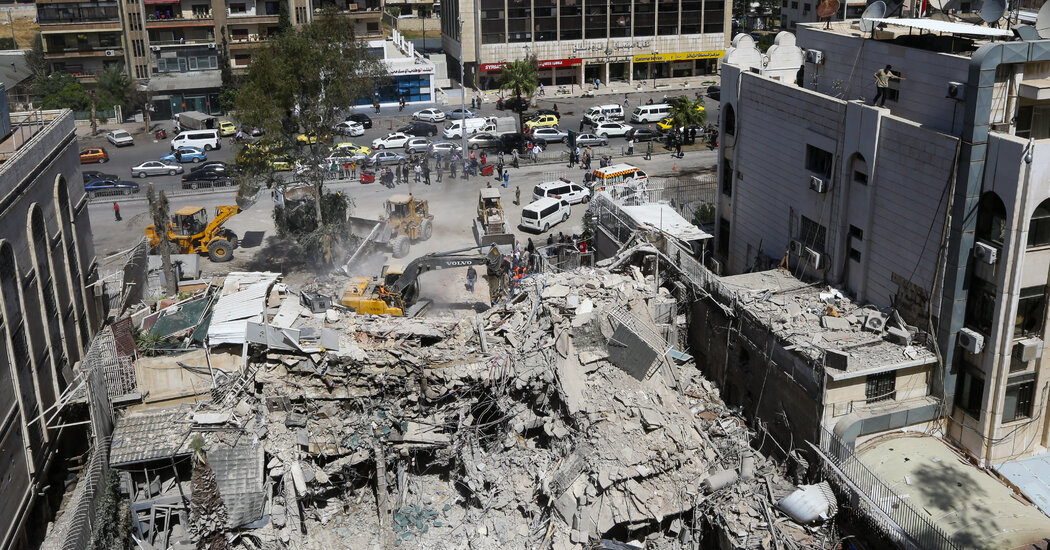For decades, Israel and Iran have fought a shadow war across the Middle East, trading clandestine attacks on land, sea, air and in cyberspace. The barrage of drones and missiles fired by Iran at Israel on Saturday – although nearly all were shot down or intercepted – marked a watershed in the conflict.
It was the first time Iran had directly attacked Israel from its own territory, according to Ahron Bregman, a political scientist and expert on Middle East security issues at King's College London, who called it a “historic event.”
Iran has widely used foreign agents to target Israeli interests, while targeted assassinations of Iranian military leaders and nuclear scientists have been a key part of Israel's strategy. Here is a brief history of the conflict:
January 2020: Israel welcomed the assassination of Maj. Gen. Qassim Suleimani, commander of the foreign-facing arm of Iran's Islamic Revolutionary Guard Corps, in an American drone strike in Baghdad.
Iran responded by attacking two bases in Iraq housing American troops with a barrage of missiles, wounding about 100 U.S. service members.
American officials said that General Suleimani was behind Iranian destabilizing activities throughout the Middle East and that he was accused of planning attacks on US embassies and Israeli targets.
2021-22: In July 2021, an oil tanker operated by an Israeli-owned shipping company was attacked off the coast of Oman, killing two crew members, according to the company and three Israeli officials. Two officials said the attack appeared to have been carried out by Iranian drones.
Iran has not explicitly claimed or denied responsibility, but a state television channel described the attack as a response to Israel's strike in Syria.
In November 2021, Israel killed Iran's top nuclear scientist, Mohsen Fakhrizadeh, and followed that up with the assassination of a Revolutionary Guards commander, Colonel Sayad Khodayee, in May 2022.
December 2023: After Israel began bombing Gaza in response to the Hamas-led attacks on October 7, Iranian-backed militias intensified their attacks. And late last year, Iran accused Israel of killing a senior military figure, Brig. Gen. Sayyed Razi Mousavi, in a missile attack in Syria.
A senior advisor to the Revolutionary Guards, General Mousavi has been described as a close associate of General Suleimani and is said to have helped oversee the shipment of weapons to Hezbollah. Israel, adopting its usual position, refused to comment directly on whether it was responsible for General Mousavi's death.
January 2024: An explosion in a suburb of Beirut, Lebanon, killed Saleh al-Arouri, a Hamas leader, along with two commanders of that group's armed wing, the first assassination of a senior Hamas official outside the West Bank and Gaza in recent years.
Officials from Hamas, Lebanon and the United States have attributed the attack to Israel, which has not publicly confirmed involvement.
Hezbollah, which receives strong support from Iran, has stepped up its attacks on Israel since al-Arouri's death. The Israeli army responded to Hezbollah in Lebanon, killing several of the group's commanders.
Later in January, Iran accused Israel of launching an airstrike on Damascus in which several senior members of the Iranian military were killed.
March and April: An Israeli drone hit a car in southern Lebanon, killing at least one person. The Israeli army said it had killed the deputy commander of Hezbollah's missile unit. Hezbollah acknowledged the death of one man, Ali Abdulhassan Naim, but provided no further details.
The same day, airstrikes killed soldiers near Aleppo, northern Syria, in what appeared to be one of the heaviest Israeli attacks in the country in years. The attacks killed 36 Syrian soldiers, seven Hezbollah fighters and one Syrian from a pro-Iranian militia, according to the Syrian Observatory for Human Rights, a Britain-based group that tracks Syria's civil war.
The Israeli army did not claim responsibility. But the country's defense minister, Yoav Gallant, wrote on social media: “We will pursue Hezbollah in every place where it operates and increase the pressure and pace of attacks.”
Three days later, Israeli warplanes struck the Iranian embassy building in Damascus, killing three top Iranian commanders and four officers.
Matthew Mpoke Bigg contributed to the reporting.





